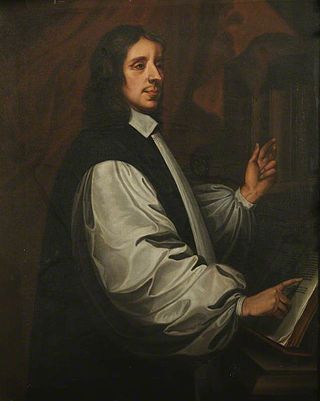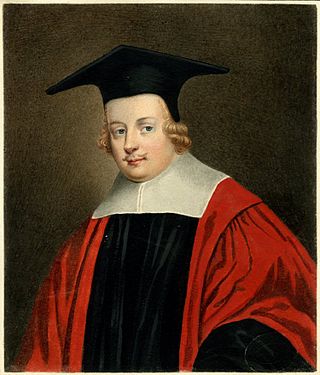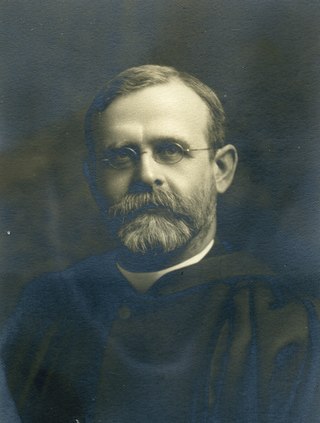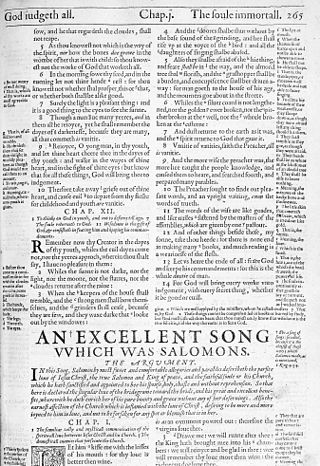Related Research Articles

Ecclesiastes is one of the Ketuvim ("Writings") of the Hebrew Bible and part of the Wisdom literature of the Christian Old Testament. The title commonly used in English is a Latin transliteration of the Greek translation of the Hebrew word קֹהֶלֶת. An unnamed author introduces "The words of Kohelet, son of David, king in Jerusalem" (1:1) and does not use his own voice again until the final verses (12:9–14), where he gives his own thoughts and summarises the statements of Kohelet; the main body of the text is ascribed to Kohelet himself.

John Fell was an English churchman and influential academic. He served as Dean of Christ Church, Oxford, and later concomitantly as Bishop of Oxford.

Henry Hammond was an English churchman, who supported the Royalist cause during the English Civil War.

Richard Allestree or Allestry was an English Royalist churchman and provost of Eton College from 1665.

The Imitation of Christ, by Thomas à Kempis, is a Christian devotional book first composed in Medieval Latin as De Imitatione Christi. The devotional text is divided into four books of detailed spiritual instructions: (i) "Helpful Counsels of the Spiritual Life", (ii) "Directives for the Interior Life", (iii) "On Interior Consolation", and (iv) "On the Blessed Sacrament". The devotional approach of The Imitation of Christ emphasises the interior life and withdrawal from the mundanities of the world, as opposed to the active imitation of Christ practised by other friars. The devotions of the books emphasise devotion to the Eucharist as the key element of spiritual life.

The Mayor of Casterbridge: The Life and Death of a Man of Character is an 1886 novel by the English author Thomas Hardy. One of Hardy's Wessex novels, it is set in a fictional rural England with Casterbridge standing in for Dorchester in Dorset where the author spent his youth. It was first published as a weekly serialisation from January 1886.
The Life with God Bible is a study Bible published by Harper in 2005, and utilizes the New Revised Standard Version (NRSV). It was formerly published under the name Renovaré Spiritual Formation Bible, but has been republished under the Life with God title.

Edmund Law was a priest in the Church of England. He served as Master of Peterhouse, Cambridge, as Knightbridge Professor of Philosophy in the University of Cambridge from 1764 to 1769, and as bishop of Carlisle from 1768 to 1787.
Pakington is the name of an English Worcestershire family, now represented by the barony of Hampton.

William Henry Griffith Thomas was an Anglican cleric and scholar from the English-Welsh border country. He has been quoted by theologian Alister McGrath in the science-versus-religion debate.

Dorothy, Lady Pakington was an English friend and supporter of learned clergymen, and a writer of religious works. She was for many years reputed to be the author of The Whole Duty of Man. She enjoyed the esteem and friendship of the most eminent divines of her time. Dr. Henry Hammond resided at her home for several years.
Robert Pakington was a London merchant and Member of Parliament. He was murdered with a handgun in London in 1536, likely the first such killing in the city. His murder was later interpreted as martyrdom, and recounted in John Foxe's Acts and Monuments. He was the grandfather of Queen Elizabeth I's favourite, Sir John "Lusty" Pakington.

Westwood House is a stately home, near Droitwich, Worcestershire, England. It has been subdivided into twelve self-contained apartments. The house has origins as an Elizabethan banqueting hall with Caroline additions and is a Grade I listed building. It was for several centuries the seat of the Pakington family. Situated west of Droitwich, it lies in the centre of its former estate, Westwood Park, which is Grade II listed in the National Register of Historic Parks and Gardens.
Dorothy Erskine, Countess of Kellie was a public figure. While married to John Pakington, a favourite of Queen Elizabeth I, she was involved in a matrimonial dispute that was heard in front of the Attorney General, Francis Bacon who was also her son-in-law.

The Graham Children is an oil painting completed by William Hogarth in 1742. It is a group portrait depicting the four children of Daniel Graham, apothecary to King George II. The youngest child had died by the time the painting was completed.

Ecclesiastes 3 is the third chapter of the Book of Ecclesiastes in the Hebrew Bible or the Old Testament of the Christian Bible. The book contains philosophical speeches by a character called 'Qoheleth', composed probably between the fifth and second centuries BC. Peshitta, Targum, and Talmud attribute the authorship of the book to King Solomon.
Margaret Bourchier, Countess of Bath was an English Tudor noblewoman. She is notable for the three high-profile and advantageous marriages she secured during her lifetime, and for her success in arranging socially impressive marriages for many of her children. Through her descendants she is common ancestor of many of the noble families of England.

Ecclesiastes 5 is the fifth chapter of the Book of Ecclesiastes in the Hebrew Bible or the Old Testament of the Christian Bible. The book contains philosophical speeches by a character called '(the) Qoheleth', composed probably between the fifth and second centuries BCE. Peshitta, Targum, and Talmud attribute the authorship of the book to King Solomon. This chapter contains advice on how to approach God the right way, and a discussion about poverty and wealth.

Ecclesiastes 6 is the sixth chapter of the Book of Ecclesiastes in the Hebrew Bible or the Old Testament of the Christian Bible. The book contains philosophical speeches by a character called '(the) Qoheleth', composed probably between the 5th and 2nd centuries BC. Peshitta, Targum, and Talmud attribute the authorship of the book to King Solomon. This chapter deals with wealth and insatiability.

Ecclesiastes 12 is the twelfth chapter of the Book of Ecclesiastes in the Hebrew Bible or the Old Testament of the Christian Bible. The book contains philosophical speeches by a character called 'Qoheleth', composed probably between the 5th and 2nd centuries BCE. Peshitta, Targum, and Talmud attribute the authorship of the book to King Solomon. This chapter continues the previous one in the sustained encouragement to make decision and the need to act speedily.
References
- Paul Elmen, Richard Allestree and The Whole Duty of Man, The Library 1951 s5-VI(1):19-27.